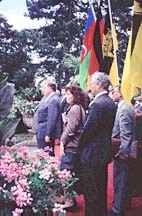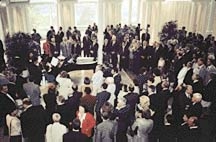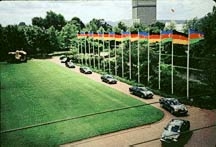|
Aliyev's Presidential
Visit by Betty Blair
Once again, Heydar Aliyev was
boarding a plane for another Presidential State visit. This time
he was off to Germany (July 1-4, 1996), leading a delegation
of more than 50 Azerbaijani governmental representatives (Ministers,
Parliament members, administrative assistants and even a few
musicians). It's all part of his foreign relations' strategy
in the unending task of establishing independent bilateral relations
with the international community.
Left: The Azerbaijani Diaspora meet President Aliyev at a reception at the Rotunda of the Petersburg Gastehaus in Konigswinter outside Bonn (July 1, 1996) Right: Aliyev's motorcade in Bonn on the way to visit Chancellor Kohl (July 2, 1996) The Trip's AgendaDiplomats and government officials
from both countries anticipate that the President's trip will
serve as a catalyst for strengthening ties and beginning many
significant projects. Three major documents were signed: one
related to educational cooperation, the second pledged to honor
treaties that had already been signed years ago between the USSR
and the Federal Republic of Germany, and the third will lead
to a substantial loan needed for updating technical equipment
at Baku's airport. One of the most significant achievements of the trip was to persuade the German government to take a more active role in helping resolve the Nagorno-Karabakh conflict which has being going on for eight years. To this end, the Germans have agreed to co-chair the Minsk Group of the Organization of Security and Cooperation in Europe (OSCE). The Minsk Group has been mandated by the 51 country members of the OSCE to find a resolution to this problem. The Germans will take on these responsibilities in December 1996, replacing the Finns as co-chair with Russia. Azerbaijanis welcome this Western alliance.
Historical LinksAzerbaijan had early links with
Germany. Large-scale migration from Germany's Stuttgart region
to the fertile valleys in Western Azerbaijan began around 1819
as a consequence of Napoleon's wars in Europe. German immigrants
settled in a village they called "Helenendorf," which
is known today as "Khanlar." It soon became the largest
German rural settlement, not only in Azerbaijan but in the Caucasus
as a whole. With hard work and ingenuity, the Germans developed
prosperous vineyards, and Azerbaijanis credit them with the introduction
of the wine industry still flourishing 170 years later. Back to Index
AI 4.3 (Autumn 1996) |




